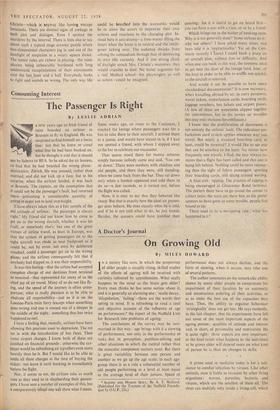Consuming Interest
The Passenger Is Right
By LESLIE ADRIAN A FEW years ago an Irish friend of mine boarded an airliner in Brussels to fly to England. He was surprised to find himself on a Swiss line : not that he knew or cared fele_ what line he had been booked on, ; but he thought it odd that it should not be Sabena or BEA. So he asked the air hostess, to find that he had boarded the wrong plane: destination, Zurich. He was amused, rather than worried, and did not kick up a fuss; but to his surprise, when the airliner landed, it was back at Brussels. The captain, on the assumption that It could not be the passenger's fault, had returned there—jettisoning a considerable quantity of petrol in order not to land overweight.
I have always taken this as a fair sample of the old attitude of airlines : 'the passenger is always right.' My friend did not know how he came to get on to the wrong aircraft, whether it was his . fault, or somebody else's; but one of the great virtues of airline travel, as least in Europe, was that the system of getting passengers on to the right aircraft was made as near foolproof as it could be; not by error, not even by deliberate mischief, could a passenger get on to the wrong Plane; and the airlines consequently felt that if anybody had slipped us, it was their responsibility.
It was this feeling—that the airline had accepted complete charge of our destinies from terminal to terminal—that represented for many of us the chief joy of air travel. Many of us do not like fly- ing, and the speed of the journey is often unim- Portant; what is really pleasant is to be able to abdicate all responsibility—just as it is on the London-Paris train ferry (except when something goes wrong and one is roused out of a sleeper in the middle of the night: something that has twice happened Jo me).
I have a feeling that, recently, airlines have been allowing this precious asset to depreciate. The rot set in with the introduction of bus fares. Then came airport charges. I know both of these are justified on financial grounds : otherwise the tax- payer would be subsidising air triivellers even more heavily than he is. But I would like to be able to settle all these charges at the time of buying the ticket : not leave it until booking in immediately before the flight.
Nor, it seems to me, do airlines take as much care as they used to in shepherding their passen- gers. I have seen a number of examples of this, but a comparatively trivial one will show what I mean. Some weeks ago, en route to the Continent, I reached the lounge where passengers wait for a bus to take them to their aircraft. 1 arrived there in a queue, and would have stayed in it, if I had not spotted a friend, with whom I slipped away to the bar to celebrate our encounter.
That queue stood there for twenty minutes simply because nobody came and said, 'You can sit down.' There were mothers with children and old people; and there they were, still standing, when we came back from the bar. They sat down only when a hostess appeared and told them to do so—a few seconds, as it turned out, before the flight was called.
Now, it is easy to say that they behaved like sheep. But that is exactly how the ideal air passen- ger does behave. He does exactly what he is told, and if he is not told what to do, he just stands. Besides, the queuers could have justified their ,queuing: for it is useful to get on board first— you can have a seat with a view, or sit by a friend.
Which brings me to the matter of booking seats. Why is it not generally done? Some airlines do it: why not others? I have asked many times, and been told it is 'impracticable.' Yet on the Con- tinent recently I round I could book a place on an aircraft plan,, without fuss or difficulty. And when one can book in this way, the tiresome need to get near the door of the lounge (and, later, of the bus) in order to be able to scuffle out quickl■, to the aircraft is removed.
And •would it not be possible, to have more standardised documentation? It is now necessary, when travelling abroad by air, to carry passports, travel tickets, embarkation cards, boarding cards, luggage vouchers, bus tickets and airport passes. (A few of these are sometimes clipped together for convenience, but to the novice air •traveller this may only increase the confusion.) • I know that the proliferation of documents is not entirely the airlines' fault. The ridiculous em- barkation card system applies whatever way you travel. But surely a standard boarding card, at least, could be invented? I would like to see one that can be attached to the lapel. No matter how frequently one travels. I find, the fear always re- mains that a flight has been called and that one is being left behind. Nothing could be more reassur- ing than the sight of fellow passengers, sporting their boarding cards, still sitting around waiting.
A final crib : tipping. The practice of tipping is being encouraged at Gloucester Road terminal. The porters there have to go round the corner to collect taxis: the taxis are there but, as the porter appears to have •gone to some trouble, people feel bound to tip.
There used to be a no-tipping ,rule : what has happened to it?






























 Previous page
Previous page